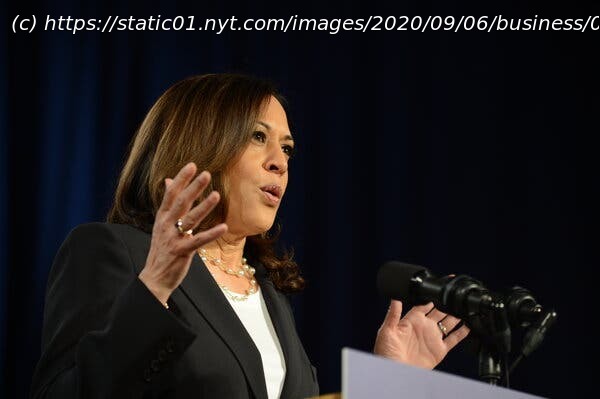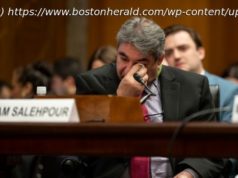Experts urge caution at Labor Day celebrations after cases spiked following other U.S. holidays. A university known for research on the virus warns its scientists against suspicious packages.
Senator Kamala Harris of California, the Democratic nominee for vice president, said she would not trust President Trump’s assurances that a coronavirus vaccine was safe, and instead would wait for medical experts to confirm the vaccine was reliable before she received an inoculation. “I will not take his word for it,” Ms. Harris said of Mr. Trump on CNN’s “Inside Politics.” “He wants us to inject bleach,” she added, referring to remarks in April when the president incomprehensibly suggested a dangerous coronavirus treatment. Ms. Harris’s remarks came after federal officials alerted state and major city public health agencies last week to prepare to distribute a vaccine to health care workers and other high-risk groups as soon as late October or early November. Given that no vaccine candidates have completed the kind of large-scale human trials that can prove efficacy and safety, that time frame has heightened concerns that the Trump administration is seeking to rush a vaccine rollout ahead of Election Day on Nov.3. For months, Ms. Harris and Joseph R. Biden Jr. have assailed Mr. Trump for his handling of the pandemic. Ms Harris’s comments on Sunday questioning a potential vaccine, as scientists racing for a vaccine report constant pressure from a White House anxious for good news, are likely to further sow skepticism among Americans considering whether to get the vaccine when it becomes available. With concern about the politicization of vaccines and treatments on the rise, five drug companies are preparing to issue a statement this week pledging to not release a vaccine unless it meets rigorous standards for effectiveness and safety. The companies, Pfizer, Moderna, Johnson & Johnson, GlaxoSmithKline and Sanofi, are aiming to reassure the public that they will not seek premature approval under political pressure. Ms. Harris on Sunday also said she and Mr. Biden would set a national “standard” for mask-wearing, stopping short of endorsing a mandate. “This is not about punishment. It’s not about Big Brother,” Ms. Harris said, adding that wearing a mask is a “sacrifice” in a time of crisis. Her comments appeared to mark a softening of the position she and Mr. Biden have previously staked out. Last month, Mr. Biden and Ms. Harris called for Americans to be required to wear masks, telling reporters after receiving a briefing from public health experts that every American should wear a mask while outside for at least the next three months and that all governors should mandate mask wearing. Mr. Biden in July suggested that if he were president, he would require mask-wearing in public, and asked if he could use “federal leverage to mandate that,” said he could, and “would from an executive standpoint.” Over the past few weeks, a Harvard scientist has made headlines for a bold idea to curb the spread of the coronavirus: rolling out antigen tests, a decades-old underdog in testing technology, to tens of millions of Americans for near-daily, at-home use. These tests are not very good at picking up low-level infections. But they are cheap and convenient, and return results in minutes. Real-time information, argued Dr. Michael Mina, the Harvard scientist, would be far better than the long delays clogging the testing pipeline. The fast-and-frequent approach to testing has captured the attention of scientists and journalists around the world, and that of top officials at the Department of Health and Human Services. But more than a dozen experts said that near-ubiquitous antigen testing, while intriguing in theory, might not be effective in practice. In addition to posing huge logistical hurdles, they said, the plan hinges on broad buy-in and compliance from people who have grown increasingly disillusioned with coronavirus testing. The aim also assumes that rapid tests can achieve their intended purpose. “We are open to thinking outside the box and coming up with new ways to handle this pandemic,” said Esther Babady, the director of the clinical microbiology service at Memorial Sloan Kettering Cancer Center in New York. But she said antigen tests that could work at home had yet to enter the market. Also, no rigorous study has shown that fast and frequent testing is better than sensitive but slower in the real world, she said. “The data for that is what’s missing.” What has been put forth about the approach is “largely aspirational, and we need to check it against reality,” said Dr. Alexander McAdam, the director of the infectious diseases diagnostic laboratory at Boston Children’s Hospital and an author of a recent report on pandemic testing strategies in The Journal of Clinical Microbiology. Most of the coronavirus tests to date rely on a laboratory technique called PCR, long considered the gold standard because it can pick up even small amounts of genetic material from germs like the coronavirus. But sputtering supply chains have compromised efforts to collect, ship and process samples for PCR tests, lengthening turnaround times. And the longer the wait, the less useful the result. Since the coronavirus pandemic started, public health authorities have faced harassment and death threats, and some have even been driven from office. Now a university deeply involved in studying the virus has warned hundreds of its researchers to be on the lookout for dangerous packages. On Monday, the University of Washington, based in Seattle, sent an email to about 500 of its researchers telling them to be wary of suspicious packages and saying that virus researchers elsewhere had been targeted. “We have received unfortunate reports from our contacts at the Federal Bureau of Investigations (FBI) that threatening mail has been sent to COVID-19 researchers on the east coast of the United States,” said the email, which was first reported by BuzzFeed News on Saturday. The BuzzFeed News article quoted an F. B. I. spokesman saying that the bureau, “along with our local law enforcement partners, responded to a suspicious package sent to a few university researchers” and that “Preliminary testing has indicated there is no threat to public safety in connection with this mailing.
Home
United States
USA — Science Covid-19 Live Updates: Kamala Harris Expresses Distrust of Trump on Vaccine Safety






